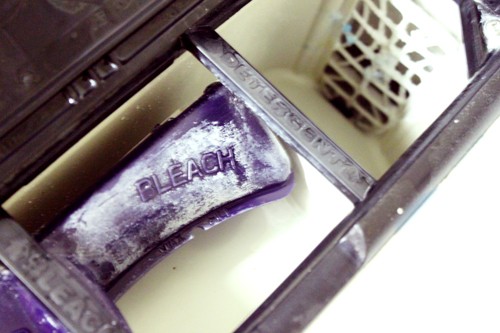What’s cleaner: a public toilet seat, door handle or your empty washing machine? The answer may surprise you.
UA microbiologist Dr. Chuck Gerba, who was recently interviewed on CBS’s “”The Early Show”” about his study of washing machine germs, said the answer is probably not your washing machine.
“”People think we’re too clean, but we’re not,”” said Gerba. “”Clothes are a good example. Clothes have more germs than ever.””
Gerba wanted to find out if certain viruses and bacteria could survive in a load of laundry after being washed in detergent with and without bleach. So he added several different types of bacteria, such as salmonella, and viruses, such as hepatitis A, to loads of laundry in a study published in the July 2007 edition of Applied and Environmental Microbiology.
“”(We found) viruses can live up to a month after being washed (in non-bleach detergent) and bacteria can live up to a few days,”” he said.
Gerba said these germs could cause several kinds of illnesses, such as diarrhea, meningitis or a cold.
“”Hepatitis A can cause infections, and if you are infected with that, it can kill you,”” he said.
The amount of germs in household washing machines and public facility machines are “”probably about the same, but it depends on how frequently someone is using hot water and bleach,”” Gerba said.
The study also found that certain germs, such as the flu, couldn’t survive easily in washing machines.
“”Certain ones, like influenza, are not an issue,”” he said. “”The flu is killed easily with detergent.””
However, Gerba said non-bleach detergents wouldn’t kill most germs because they “”are only largely designed to remove dirt, not microorganisms.””
His study found that the most common germ the average household washing machine contains is E. coli bacteria.
“”The average laundry load has about 100 million E. coli in the water when you do a load of undergarments,”” he said. “”The E. coli is from fecal matter.””
He said the best way to prevent illness from washing machines is to first run a load of undergarments with bleach detergent and hot water to sanitize the machine before washing other clothing. He also said clothes should be put in the dryer for at least 45 minutes.
“”Water should be at about 140 degrees (Fahrenheit) when hot and should reduce viruses by 99.99 percent if used with bleach,”” he said. “”The dryer will kill up to another 99 percent if it goes for 45 minutes.””
Clothes are now dirtier than ever because only five percent of people wash their clothes with hot water today, due to the invention of cold-water detergent in the last 20 years. Before that, most people used hot water to wash their clothes, Gerba said.
“”That hot water is really critical in killing those bacteria,”” he said.
Gerba added that the reason toilet seats and bathroom door handles are cleaner than most washing machines is because most people wipe off toilet seats and between 70 and 80 percent of the public wash their hands.
Gerba couldn’t say how many people get sick from washing machines because he said there is no way to track that information, but many UA students are concerned about getting sick from their laundry after hearing the news.
“”Wow, that’s really surprising,”” said anthropology freshman Orrin Frederick, who lives in Cochise Residence Hall. “”I actually did my laundry today. The more I think about it, it seems plausible. But you clean stuff with it so you figure it’s clean.””
Frederick said while he sometimes uses bleach and always uses the dryer, he usually doesn’t use hot water.
“”I’ll probably use bleach more often,”” he said. “”Not all the time, but more than normal.””
Some students were shocked by the information but don’t want to wash their clothes with hot water.
“”Ew, that’s actually kind of gross,”” said undeclared sophomore Juliana Campbell, who shares an apartment off campus. “”It makes me want to go home and sanitize my machine. You figure it would be clean.””
While Campbell said she’s going to start using bleach more often, she said she’s probably going to continue to wash her clothes with cold water because she doesn’t want to shrink them.
The news also made some students want to give up doing laundry altogether.
“”That’s pretty shocking,”” said undeclared freshman Pavel Borisenko, who does his laundry at his girlfriend’s house. “”I don’t like doing laundry anyway, though, so that’s a good excuse not to do it.””









